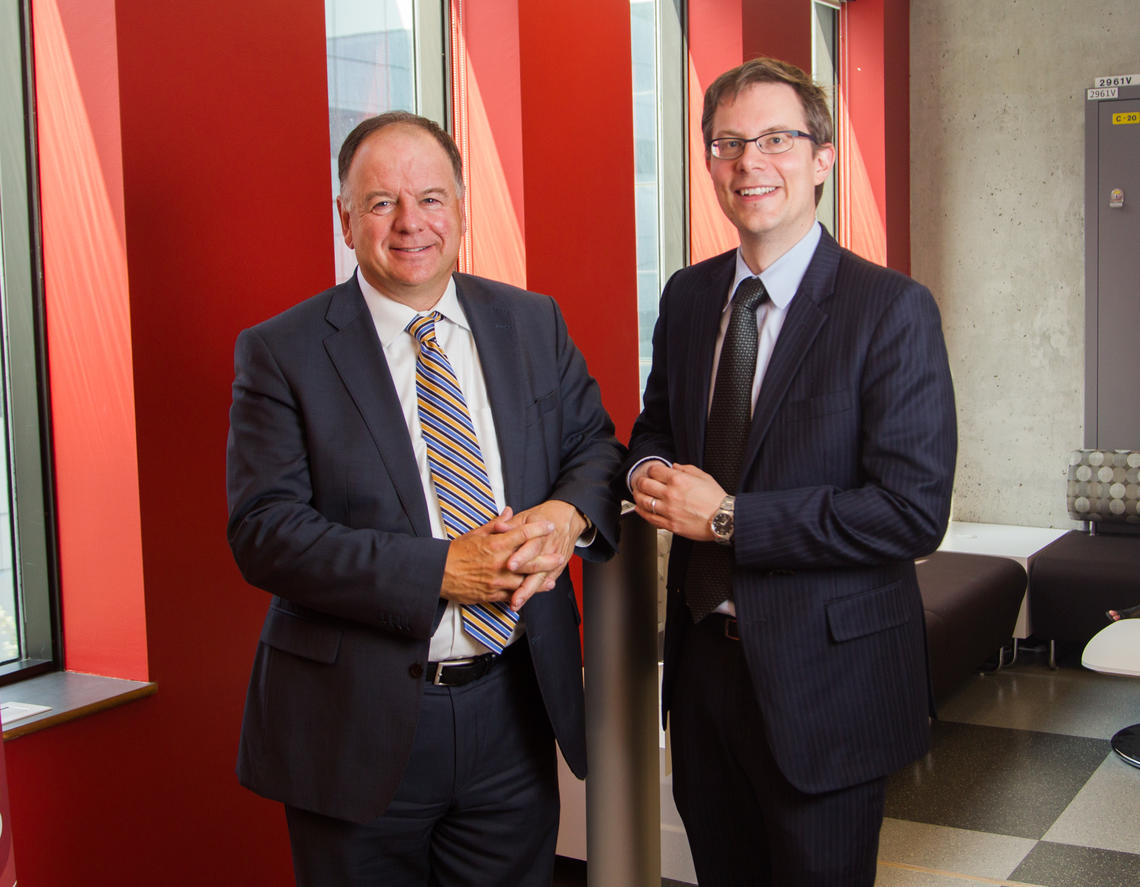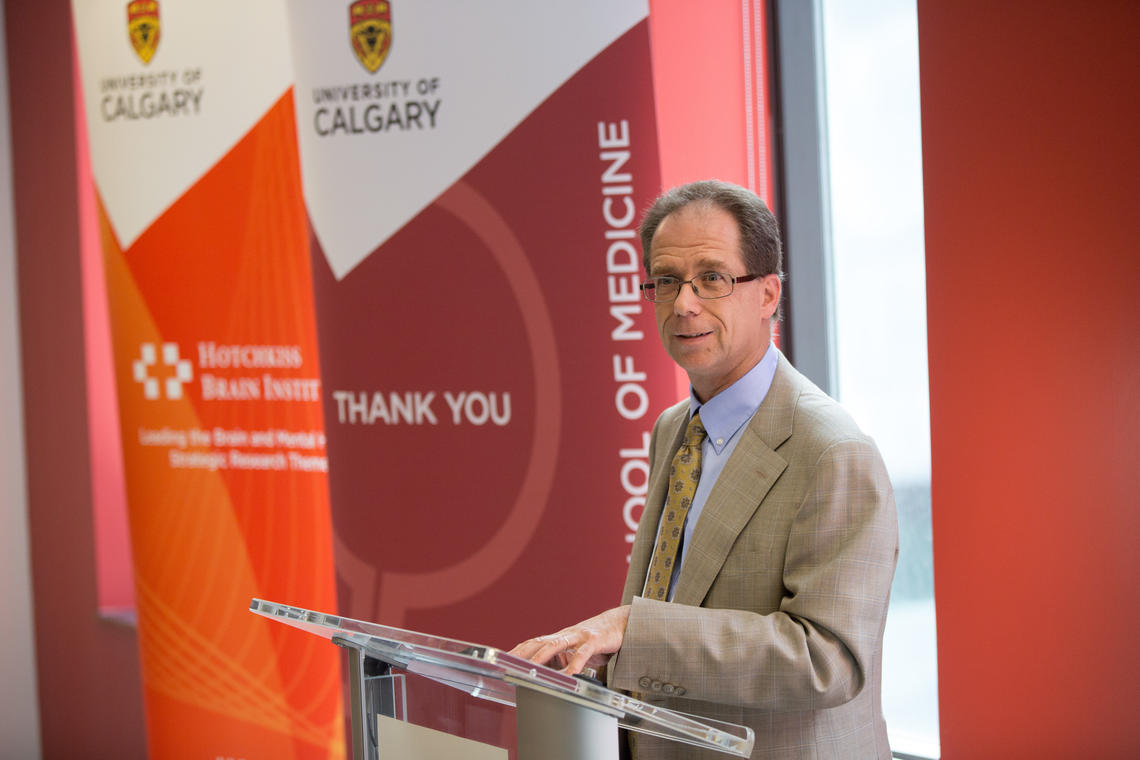June 11, 2015
New state-of-the-art research centre houses top experts in brain aging

Paul Wanklyn, left, and Dr. Eric Smith at the opening of the Ron and Rene Ward Centre.
Using brain power to battle brain diseases, a new space in the Hotchkiss Brain Institute (HBI) at the Cumming School of Medicine is bringing together a group of like-minded researchers to discover new ways of preventing and treating illnesses such as dementia.
A direct result of a remarkable $6-million gift from the Ronald and Irene Ward Foundation to the University of Calgary, the Ron and Rene Ward Centre for Healthy Brain Aging Research officially opened June 10.
The 12,000-square-foot facility houses experts in stroke, dementia, Alzheimer’s disease, Parkinson’s disease and medical imaging. While their specific studies differ, they all share the common goal of a better understanding of how the brain ages in a healthy way, and what goes wrong in cases when it doesn’t.
Having scientists, clinical researchers and trainees housed in the same space will facilitate an organic opportunity for collaboration that researchers believe could lead to innovative solutions for brain disorders.
"When you bring people with the diversities of experiences, perspective and methodological knowledge together in this kind of milieu, you get collaborative outcomes that are much greater than the sum of their parts,” says Dr. Eric Smith, the Katthy Taylor Chair in Vascular Dementia. “Such collaborations will allow me to answer questions that I would never be able to answer on my own.”
The aging brain: an area in critical need of study
As Canadians experience a much longer life expectancy through improved health care, we face an increased risk of age-related health problems. Because of this, dementia-related care is now the top financial burden on the Canadian health-care system.
One in three Canadians will be affected by a brain or nervous system disorder or injury in their lifetime. Susceptible to conditions such as vascular dementia, Alzheimer’s, stroke and Parkinson’s, the aging brain has been identified by the university and HBI as an area of critical need on the research front.
The space’s namesakes, Ron and Rene Ward, had a desire to give after Ron was diagnosed with Lewy body dementia — a condition associated with Parkinson’s that causes rigid muscles, tremors and slows movement. It’s the second most common type of progressive dementia after Alzheimer’s, and it resulted in Ron’s passing in 2007 following an energetic, health-driven life into his 70s.
“It's difficult to watch someone deteriorate so quickly,” says Paul Wanklyn, nephew of Ron and Rene, and trustee of the foundation. “And the surprising and sad part of it all is that it couldn't have happened to a healthier person.”

Samuel Weiss, director of the Cumming School of Medicine's Hotchkiss Brain Institute.
Seeking the full picture
The Centre will be a technological hub, using high levels of imaging and data analysis to seek answers. Research focused on brain imaging techniques and applications are important in understanding the changes in a normal functioning brain, compared to seeing how disease or age changes the brain. Studying those differences leads to new methods of treatment, which researchers at the HBI will be able to test rapidly.
"Earlier detection means we have a better chance of intervening," says Bruce Pike, the CAIP Chair in Healthy Brain Aging.
Some of the Principal Investigators at the Centre and their work include:
- Dr. Eric Smith, Katthy Taylor Chair in Vascular Dementia — Smith is studying the relationship between Alzheimer’s disease and cerebral small vessel disease, which is caused by damage to blood vessels deep within the brain matter. Links between the diseases may shed light on how they cause cognitive impairment and other disability.
- Dr. Michael Hill, Heart and Stroke Foundation of Alberta, NWT & Nunavut (HSFA) Professorship in Stroke Research — Hill is the senior author of ESCAPE, a ground-breaking study that showed a clot retrieval procedure known as endovascular treatment reduced the mortality rate of participants by 50 per cent and led to a dramatic improvement in disability outcomes.
- Oury Monchi, PhD, Tourmaline Oil Chair in Parkinson’s Disease — Monchi has been a pioneer in using neuroimaging techniques to study the origins and evolution of cognitive deficits in Parkinson's disease, with the ultimate goal of the early prediction of dementia. Early results in his therapeutic study of transcranial magnetic stimulation—a focused magnetic stimulation to the outer surface of the brain—indicates the potential to improve memory and decision-making in patients with Parkinson’s.
- Bruce Pike, PhD, CAIP Chair in Healthy Brain Aging — One of the world’s leading experts in brain imaging, Pike was recruited for his ability to bring data analysis and medical imaging together, interpreting real-time images in normal brain development and diagnosing and evaluating treatments for conditions such as stroke, multiple sclerosis, epilepsy, Alzheimer’s, vascular dementia and Parkinson’s disease.
- Dr. Zahinoor Ismail, clinical associate professor — Ismail is a psychiatrist who studies how brain metabolism can be affected by depression, a condition that often accompanies dementia. Using imaging scans as a diagnostic tool, Ismail and colleagues can see how glucose is used by the brain. Even before they exhibit symptoms, patients who develop dementia may show a decreased rate of glucose metabolism in the brain, giving clinicians a key indicator that the person is at risk of developing dementia.
A lasting legacy of creating better health outcomes
“Seeing how excited the researchers are and how hard they're all working to produce fantastic results for better health in our community is important to our family and would have fulfilled the Wards’ wishes,” says Wanklyn.
Study of neurodegenerative disorders falls within the University of Calgary’s Brain and Mental Health strategic research theme, led by the HBI, one of the six themes guiding the university toward its Eyes High goals. Whether it’s working together locally or partnering with national and international colleagues, the HBI is leading the way in initiating and participating in meaningful collaborations that are advancing research approaches around the world. The new Ron and Rene Ward Centre for Healthy Brain Aging Research will only enhance that ability.
“We are so very pleased and proud that the Ronald and Irene Ward Foundation, and the Wards’ extended family, are our partners in this far-sighted and far-reaching collaboration to improve the health and well-being of individuals and families dealing with age-related brain diseases,” said Samuel Weiss, PhD, HBI director.
